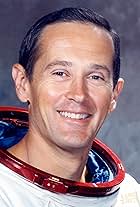Charles Duke
☼ Born on 3 December 1935, in Charlotte, North Carolina, USA
Biography
Charles Moss Duke Jr. (born October 3, 1935) is an American former astronaut, United States Air Force (USAF) officer and test pilot. As lunar module pilot of Apollo 16 in 1972, he became the tenth and youngest person to walk on the Moon, at age 36 years and 201 days.
A 1957 graduate of the United States Naval Academy, he joined the USAF. He completed advanced flight training on the F-86 Sabre at Moody Air Force Base in Georgia, where he was a distinguished graduate. After completion of this training, Duke served three years as a fighter pilot with the 526th Fighter-Interceptor Squadron at Ramstein Air Base in West Germany. After graduating from the Aerospace Research Pilot School in September 1965, he stayed on as an instructor teaching control systems and flying in the F-101 Voodoo, F-104 Starfighter, and T-33 Shooting Star.
In April 1966, Duke was one of nineteen men selected for NASA's fifth group of astronauts. In 1969, he was a member of the astronaut support crew for Apollo 10. He served as CAPCOM for Apollo 11, the first crewed landing on the Moon. His distinctive Southern drawl became familiar to audiences around the world, as the voice of a Mission Control made nervous by a long landing that almost expended all of the Lunar Module Eagle descent stage's propellant. Duke's first words to the Apollo 11 crew on the surface of the Moon were flustered, "Roger, Twank...Tranquility, we copy you on the ground. You got a bunch of guys about to turn blue. We're breathing again. Thanks
(click to expand)
a lot!"
Duke was backup lunar module pilot on Apollo 13. Shortly before the mission, he caught rubella (German measles) from a friend's child and inadvertently exposed the prime crew to the disease. As Ken Mattingly had no natural immunity to the disease, he was replaced as command module pilot by Jack Swigert. Mattingly was reassigned as command module pilot of Duke's flight, Apollo 16. On this mission, Duke and John Young landed at the Descartes Highlands, and conducted three extravehicular activities (EVAs). He also served as backup lunar module pilot for Apollo 17. Duke retired from NASA on January 1, 1976.
Following his retirement from NASA, Duke entered the Air Force Reserve and served as a mobilization augmenter to the Commander, USAF Basic Military Training Center, and to the Commander, USAF Recruiting Service. He graduated from the Industrial College of the Armed Forces in 1978. He was promoted to brigadier general in 1979, and retired in June 1986. He has logged 4,147 hours' flying time, of which 3,632 hours were in jet aircraft, and 265 hours were in space, including 21 hours and 38 minutes of EVA.
In the role of actor
Apollo 11 (17/03/2019)
Relive the 1969 moon landing in Apollo 11. On July 16, 1969, Neil Armstrong, Michael Collins, and Buzz Aldrin blasted off from the Kennedy Space Center in Florida to begin their historic eight day mission to become the first men in land on the moon. With the help of newly discovered audio recordings and 65mm […]


